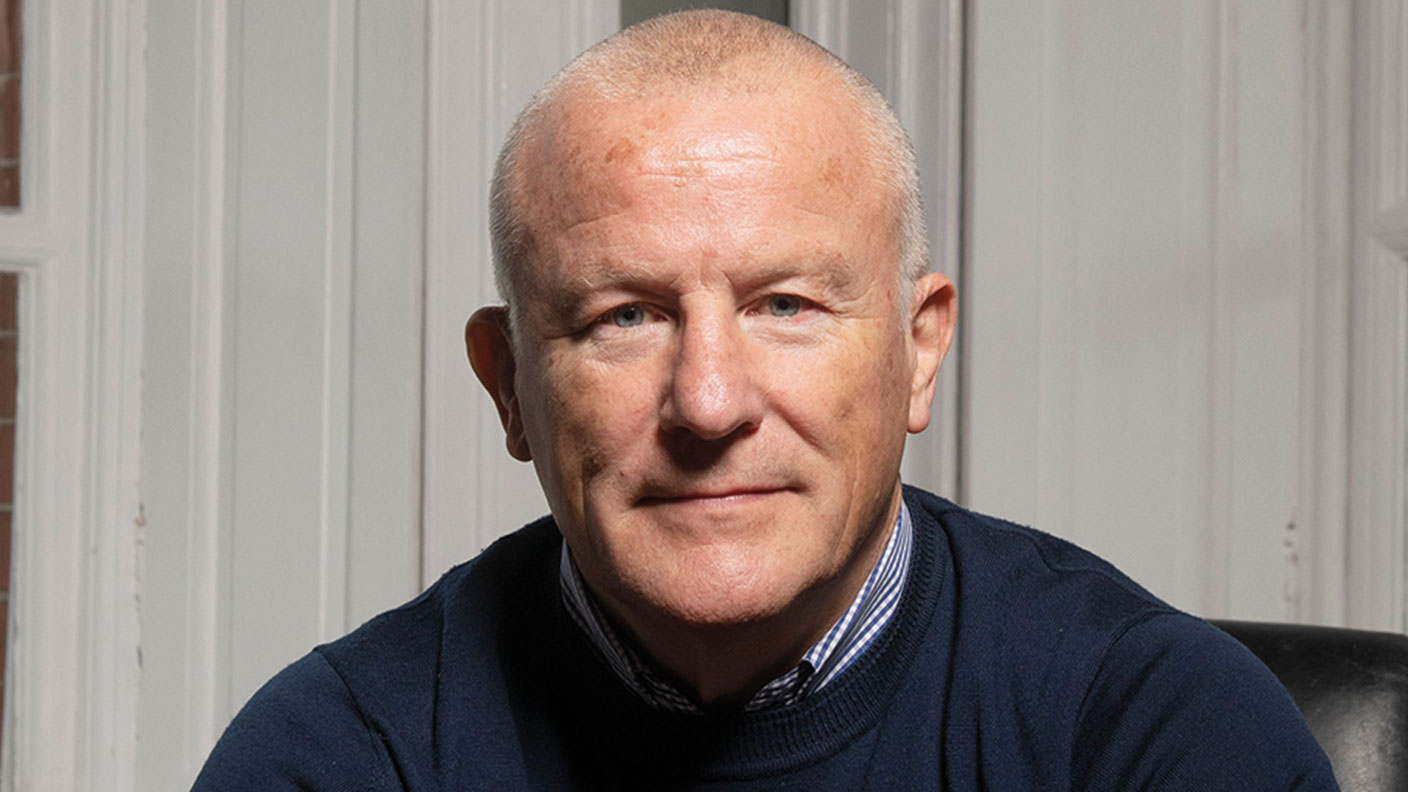Get the latest financial news, insights and expert analysis from our award-winning MoneyWeek team, to help you understand what really matters when it comes to your finances.
You are now subscribed
Your newsletter sign-up was successful
Want to add more newsletters?

The star manager's tactic of throwing a lot of mud at the wall and hoping some will stick hasn't worked.
It is three years since Neil Woodford's Patient Capital (LSE: WPCT) launched to considerable fanfare. The new investment trust had a very different strategy to that which dominated Woodford's Invesco funds. It would invest in early-stage, high-growth firms some quoted, some not with "outstanding intellectual property" that would deliver "exceptional long-term returns".
The aim of nurturing UK technology and biotechnology companies, despite the overwhelming US dominance of these sectors, appealed to patriotic investors, as did the innovative charging structure. Woodford was to take no management fee, only a performance fee of 15% of returns above 10% per annum. Investors flocked to the fund, whose target size was raised from £200m to £800m.
Try 6 free issues of MoneyWeek today
Get unparalleled financial insight, analysis and expert opinion you can profit from.

Sign up to Money Morning
Don't miss the latest investment and personal finances news, market analysis, plus money-saving tips with our free twice-daily newsletter
Don't miss the latest investment and personal finances news, market analysis, plus money-saving tips with our free twice-daily newsletter
Further disasters are likely
Trading in the shares opened at a healthy premium to the 100p issue price, peaking in August 2015 at 119p. But disillusion has set in following a string of bad news. The shares fell to 73p, a 14% discount to net asset value (NAV), before bouncing a bit this week. The patience Woodford asked for three years ago is wearing thin.
An early casualty was Circassia, a pharmaceutical company whose share price collapsed following the failure of trials in the notoriously difficult area of allergy treatment. An investment in another pharmaceutical company, Northwest Biotherapeutics, was written off after it ran into financial difficulties and the shares were suspended.
The shares of 4D Pharma, which hopes to develop treatments based on bacteria in the human gut, soared in 2015, but Woodford failed to take profits and shares have since slumped by 87%. Other companies formed to commercialise promising portfolios of intellectual property (IP) from academia, such as Allied Minds and IP Group, have also struggled.
There has been the odd success story the share price of online estate agent Purplebricks is down a third from its peak, but has still more than trebled since listing in late 2015. And there may be some real winners in the portfolio but more disasters are also likely.
More risk; less return
Woodford's response to adversity has been to increase risk. The limit on unquoted investments has been raised from 60% of net assets to 80% and the ratio of borrowings to net assets is close to the limit of 20%. The top ten holdings, mostly unquoted, account for 62% of the portfolio, 70% of which is in the UK.
Over half of the portfolio is in healthcare, mostly early stage biotechnology, and a further 12% in the technology sector. (That's not including Purplebricks, Atom Bank or Oxford Sciences Innovation an IP commercialisation fund which are classed as financials.) Woodford appears to have thrown a lot of mud at the wall in the hope that some of it will stick rather than having made focused investments based on detailed, expert analysis.
This stands in stark contrast to Syncona (LSE: SYNC), the result of the merger of Wellcome Trust's investment arm with the Battle Against Cancer Investment Trust. After just a year, this has already met significant clinical success and the shares have risen 50%. It shares just one investment with Patient Capital, though its life science investments have, so far, all been in the UK. With a focused portfolio of illiquid, high-risk investments, imprudently financed with debt, Patient Capital's shares could fall a lot further. It's not too late to switch into Syncona.
Activist watch
Consumer-products group Newell Brands, the company behind Sharpie markers and Rubbermaid plastic containers, has reached an agreement with activist investor Carl Icahn to appoint his four suggested directors to the board.
This is a shrewd move, says Sarah Halzack on Bloomberg's Gadfly column Newell now has "some powerful new ammunition" with which to fight activist fund Starboard Value, which wants to dump the company's entire board, claiming "management missteps have hurt financial performance". It can "make a convincing case to shareholders that it is plenty open to fresh ideas and outside help". However, shareholders are still "rightly looking for more evidence Newell doesn't need Starboard's help", says Halzack.
Short positions a new way to bet on start-ups
Chancellor Philip Hammond proposed a new kind of higher-risk Enterprise Investment Scheme (EIS) in his Spring Statement, says Kate Beioley in the Financial Times.
The new type of EIS fund, which is currently under consultation, could offer one of four different kinds of tax relief, including allowing people to write off parts of a capital-gains bill (for example, from the sale of a property) by reinvesting it in an EIS fund, or letting investors receive dividends from EIS companies free of tax, after holding them for a certain period. In return, the fund would have to target "knowledge-intensive companies" early-stage firms with high R&D spending.
The world's first energy-storage fund will list in London later this month, reports Bloomberg. Private-equity firm Gore Street Capital is looking to raise £100m, with the fund set to invest in large-scale batteries. The Gore Street Energy Storage Fund is likely to follow a similar model to other clean-energy listed vehicles in the UK, such as Bluefield Solar Income Fund and Greencoat UK Wind; these funds use the so-called "yieldco" model, which pays dividends to shareholders generated from electricity sales. The firm is targeting a 7% dividend yield, and plans to invest in between 10 and 13 projects within 18 months.
The fintech trust spun out of the Rothschilds' RIT Capital Partners has missed its IPO (initial public offering) target, reports CityWire. Augmentum Capital floated last week, having raised just £94m of its targeted £125m. Both RIT and the management team at Augmentum ended up putting more into the IPO than expected.
Get the latest financial news, insights and expert analysis from our award-winning MoneyWeek team, to help you understand what really matters when it comes to your finances.

Max has an Economics degree from the University of Cambridge and is a chartered accountant. He worked at Investec Asset Management for 12 years, managing multi-asset funds investing in internally and externally managed funds, including investment trusts. This included a fund of investment trusts which grew to £120m+. Max has managed ten investment trusts (winning many awards) and sat on the boards of three trusts – two directorships are still active.
After 39 years in financial services, including 30 as a professional fund manager, Max took semi-retirement in 2017. Max has been a MoneyWeek columnist since 2016 writing about investment funds and more generally on markets online, plus occasional opinion pieces. He also writes for the Investment Trust Handbook each year and has contributed to The Daily Telegraph and other publications. See here for details of current investments held by Max.
-
 Do you face ‘double whammy’ inheritance tax blow? How to lessen the impact
Do you face ‘double whammy’ inheritance tax blow? How to lessen the impactFrozen tax thresholds and pensions falling within the scope of inheritance tax will drag thousands more estates into losing their residence nil-rate band, analysis suggests
-
 Has the market misjudged Relx?
Has the market misjudged Relx?Relx shares fell on fears that AI was about to eat its lunch, but the firm remains well placed to thrive
-
 Neil Woodford’s back – but has he really learned anything?
Neil Woodford’s back – but has he really learned anything?Opinion Disgraced fund manager Neil Woodford is planning a comeback. But he doesn’t seem to have learned much from his many mistakes. So why would anyone invest with him now?
-
 Neil Woodford’s back – but sometimes sorry isn’t enough
Neil Woodford’s back – but sometimes sorry isn’t enoughAdvice Neil Woodford’s funds blew up in 2019. Now he is on the comeback trail. But his apologies are unconvincing.
-
 Woodford investor? Your first payment is coming soon
Woodford investor? Your first payment is coming soonNews Private investors left stranded by the collapse of the Woodford Equity Income fund will soon be getting at least some of their money back. But they will have to wait a while longer to see how much more – if any – they will receive.
-
 Neil Woodford continues to cast a shadow over his successor at Invesco
Neil Woodford continues to cast a shadow over his successor at InvescoFeatures Mark Barnett, former star manager Neil Woodford’s successor at Invesco, has applied the same formula, and is struggling.
-
 Is it time to buy Patient Capital Trust?
Is it time to buy Patient Capital Trust?Features Neil Woodford’s Patient Capital Trust has been taken over by asset manager Schroders. The share price has surged - but should you buy in? John Stepek looks at the trust’s prospects.
-
 Neil Woodford: no silver lining for his investors
Neil Woodford: no silver lining for his investorsEditor's letter Neil Woodford made every mistake it is possible to make as a money manager. And his investors have been stiffed. But however wrong it all went, Woodford never stopped taking the fees.
-
 Woodford believed his own hype – now his investors are paying the price
Woodford believed his own hype – now his investors are paying the priceFeatures Neil Woodford was once one of the brightest stars in Britain’s investment firmament. Then he came crashing down to earth. John Stepek explains what went wrong.
-
 Woodford’s empire collapses – what happens to his investors now?
Woodford’s empire collapses – what happens to his investors now?Features With Neil Woodford getting his marching orders and his funds being shut down, John Stepek explains what it means for his former empire, and for those with money locked in.
